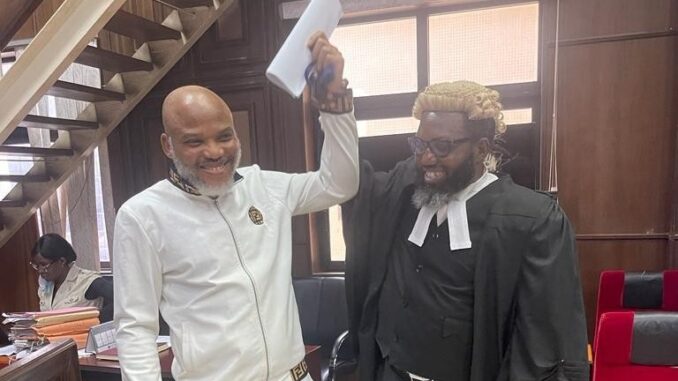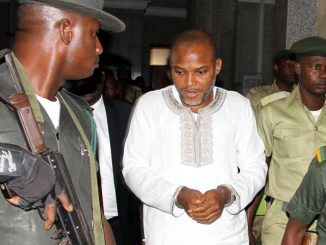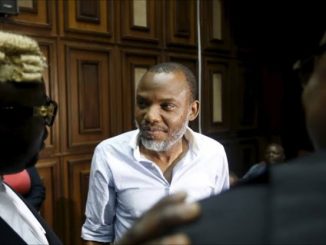
By Marvellous Nyang
The Appeal Court sitting in Abuja, on Thursday, October 12, 2022, challenged the jurisdiction of the Federal High Court on the trial of Nnamdi Kanu, the leader of the proscribed Indigenous People of Biafra (IPOB), and thereby discharged him.
The Federal Government had preferred a 15-count charge which includes treasonable felony and terrorism course against Kanu, which he allegedly committed in the course of his separatist campaigns, and he is being prosecuted at the Federal High Court in Abuja.
In their ruling, a three-man panel of the Court of Appeal said the Federal High Court lacks the jurisdiction to try him given his abduction and extraordinary rendition to Nigeria, which the court said was in “flagrant violation of the OAU convention and protocol on extradition.”
The Appellate court held that the 15-count charge preferred against Kanu did not disclose the place, date, time and nature of the alleged offences before being “unlawfully extradited to Nigeria in clear violation of international treaties.”
The Appeal Court further held that the Federal Government failed to disclose where Nnamdi Kanu was arrested despite the grave allegations against him.
ALSO READ: Court dismisses Nnamdi Kanu’s fundamental rights suit against DSS suit
Recalled Kanu had repeatedly called for the breakaway of southern Nigeria, especially the predominantly Igbo region to form the Republic of Biafra.
Kanu was, on October 2015, arrested by Nigerian authorities on an 11-count charge bordering on “terrorism, treasonable felony, managing an unlawful society, publication of defamatory matter, illegal possession of firearms and improper importation of goods, among others,” but he was granted bail on April 2017 for medical reasons.
Afterwards, Kanu, who jumped his bail fled Nigeria in September 2017 after his home was invaded by the military in Afara-Ukwu, near Umuahia, Abia State.
Later on, he was sighted in Israel and where he intensified his mobilisation of supporters in Nigeria to take into violence means of achieving their secession plans.
Speaking on Kanu after his arrest, Minister of Justice, Abubakar Malami said after Kanu was rearrested and brought back to Nigeria in June 2021, “he has, upon jumping bail, been accused of engaging in subversive activities that include inciting violence through television, radio and online broadcasts against Nigeria and Nigerian state and institutions.”
Though Kanu had denied any wrongdoing, Malami said, “Kanu was also accused of instigating violence, especially in the Southeastern Nigeria that resulted in the loss of lives and property of civilians, military, paramilitary, police forces and destruction of civil institutions and symbols of authorities.”




